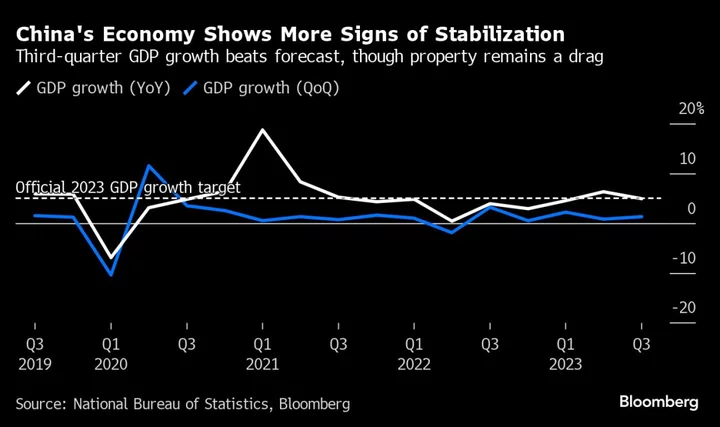China’s economy gained momentum last quarter as people ramped up spending on everything from restaurants and alcohol to cars, offsetting a drag from the property crisis and putting Beijing’s annual growth goal well within reach.
Gross domestic product for the three months ended September far exceeded economists’ expectations — both on-year and on-quarter — as government stimulus efforts appeared to take root. The figures got a boost from bumper retail sales growth last month, which recorded the biggest jump since May. The jobless rate was the lowest in nearly two years.
“For the short term, at least one thing is clear: China’s growth has largely bottomed out,” said Zhou Hao, chief economist at Guotai Junan International in Hong Kong. “While the risk of slower growth for next year remains on the table, the short-term economic momentum has at least cleared some of the clouds over the economy.”
Wednesday’s data was a boon for the global economy and President Xi Jinping’s government, which needs the world’s second-largest economy to build steam. The release of the third-quarter figures by the National Bureau of Statistics coincided with Xi’s keynote address at the Belt and Road Forum, where he looked to reinvigorate his signature $1 trillion investment pact amid growing headwinds caused by the nation’s slowdown and geopolitical tensions.
The nation is “very confident” that it can reach an annual growth goal of about 5% for 2023, National Bureau of Statistics Deputy Head Sheng Laiyun said at a briefing Wednesday discussing the data. GDP will need to grow more than 4.4% in the final three months of the year to hit that target.
Local and global markets responded positively to the data. The yuan strengthened 0.2% in both onshore and offshore markets. Currencies of countries whose growth is linked to China — such as Australia, Thailand and South Korea — also rose. Metals including copper and aluminum extended gains.
The Hang Seng China Enterprises Index erased its post-data rally, and onshore stocks gauges remained lower for the day. A Bloomberg gauge of Chinese developers shares were in line to hit their lowest since April 2009.
The muted reaction in equities in part came down to further concerns about real estate. The economy still faces some very serious overhangs from that sector. A credit squeeze among developers has widened: The clock is still ticking for Country Garden Holdings Co. to avert its first public dollar bond default.
Authorities have taken several steps in recent months to bolster the property market, including a broad relaxation of downpayment requirements and cuts to some mortgage rates. But that hasn’t been enough to turn things around: Property investment contracted 9.1% in the first nine months of the year, data showed Wednesday. Home sales by floor area fell 6.3% year-to-date, while construction of new housing starts plunged almost 24%.
“Property indicators remained very weak in September,” said Louise Loo, China economist at Oxford Economics Ltd. She added that the divergence between the “relatively decent” macroeconomic data and weak sentiment in real estate is so large that it’s tough to see how momentum will accelerate “in the absence of meaningful stimulus.”
Key Figures From the Data:
- Industrial output rose 4.5% in September from a year earlier, above the median estimate of a 4.4% increase
- Retail sales expanded 5.5% in September; median forecast was 4.9%
- Fixed-asset investment increased 3.1% in the first nine months of the year compared to the same period in 2022, lower than the median forecast of 3.2%
- Property investment fell 9.1% in the January-to-September period, worse than projections
- The jobless rate was 5% at the end of September, improving from August
Even the strong retail sales figures reflected ongoing concerns about housing. Consumer spending on restaurants, food, clothing and cars all improved. But purchases of furniture, construction material and home electronics were still subdued, evident of the property slump.
NBS officials expressed concern about demand, too. While they said the latest figures “laid a solid foundation” for achieving growth goals, they concluded that domestic demand remained insufficient.
What Bloomberg Economics Says ...
“The latest batch of data on China provide some a relief, but aren’t a cause for celebration. Faster-than-forecast GDP growth showed the recovery picked up speed in 3Q. Yet September’s weak momentum in production and consumption calls into question whether it will continue in 4Q — and indicates the need for more policy support.”
— Chang Shu and David Qu, economists
Read the full report here.
“It is encouraging to start seeing some improvement in data, but probably too early to conclude that the economy is already back on a strong footing,” said Miao Ouyang, greater China economist at BofA Global Research.
Authorities are considering issuing more sovereign bonds this year to spend on infrastructure, Bloomberg News reported last week, as well as mulling ways to shore up stock market confidence. Economists also expect China to further cut interest rates and banks’ reserve requirement ratio this year.
“The investment aspect remains weak, but consumption seems to have recovered nicely,” said Raymond Yeung, chief economist for Greater China at Australia & New Zealand Banking Group Ltd. “We believe the policymakers will focus more on financial stability. Stimulus measures will be ‘measured.’”
--With assistance from Wenjin Lv, Iris Ouyang, Ishika Mookerjee and Tom Hancock.
(Updates with additional details.)

